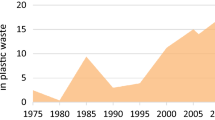Abstract
Having accurate data of municipal solid waste generation amount is an indispensable factor for effective planning of a waste management system. However, to have accurate estimation, significant waste generation factors have to be identified. In this study, Bangkok is selected as representative of urban cities in developing countries. The city has coped with consequences of a vast amount of waste generation and ineffective waste management system for years. The study aims to examine influential variables affecting generation amount and management problems in Bangkok based on people’s attitudes. Questionnaire surveys and interviews are methods of acquiring primary data. To verify reliability of obtained data, statistical analyses are conducted using the methods of descriptive analysis, hypothesis test, and Pearson correlation. The study shows seven influential waste generation variables. In addition, to learn the exact situation of waste management system, interview results are qualitatively evaluated using stakeholder analysis and TOWS matrix. Stakeholders’ points of concerns and suggested waste management solutions are identified for using in the formulation of waste management plan. The results of this study can facilitate a thorough evaluation as inputs of future research for sustainable waste management system.




Similar content being viewed by others
References
Anghinolfi D, Paolucci M, Robba M, Taramasso AC (2013) A dynamic optimization model for solid waste recycling. Waste Manag 33:287–296
Turner RK, Powell J (1991) Towards an integrated waste management strategy. Environ Manag Health 2:6–12
Seik F (1997) Recycling of domestic wastes: early experiences in Singapore. Habitat Int 21(3):277–289
Wilson D (2007) Development drivers for waste management. Waste Manage Res 25:198–207
Faccio M, Persona A, Zanin G (2011) Waste collection multi objective model with real time traceability data. Waste Manag 31(12):2391–2405
Department of Environment (DOE) (2013) Handbook of community based solid waste management. Mataka Press, Bangkok
Babayemi O, Dauda T (2009) Evaluation of solid waste generation, categories and disposal options in developing countries: a case study of Nigeria. J Appl Sci Environ Manag 13(3):83–88
Thanh P, Matsuri Y, Fujiwara T (2010) Household solid waste generation and characteristic in a Mekong Delta city, Vietnam. J Environ Manag 91:2307–2321
Buenrostro O, Bocco G (2003) Solid waste management in municipalities in Mexico: goals and perspectives. Resour Conserv Recycl 39:251–263
Eriksson O, Bisaillon M (2011) Multiple system modelling of waste management. Waste Manag 31:2620–2630
Chen HW, Chen JC, Chang NB (2010) Environmental performance evaluation of large-scale municipal incinerators using data envelopment analysis (DEA). Waste Manag 30(7):1371–1381
United Nations (UN) (2014) World urbanization prospects: the 2014 revision, New York, United Nations Department of Economic and Social Affairs, the United Nations Secretariat
Bangkok Statistics Report (2013) From Bangkok Statistics Report—Social perspective (2013) http://office.bangkok.go.th/pipd/07Stat%28Th%29/Stat_57_6M/TH_SOCIAL_2556.pdf. Accessed 17 Mar 2015
Bangkok Waste Generation (2013) From Bangkok Metropolitan administration—waste generation by district http://203.155.220.174/modules.php?name=activeshow_mod&file=article&asid=249. Accessed 17 Mar 2015
Bangkok Environment Report (2012) From Bangkok State of the environment (2010–2011) http://203.155.220.174/pdf/AW_BKKEnvironmentReport2010-2011.pdf. Accessed 01 Dec 2014
Public Cleansing Department (PCD) (2014) From Solid waste and nightsoil management in Bangkok http://portal.bangkok.go.th/subsite/index.php?strOrgID=001054. 13 Jan 2014
United Nations Environment Programme (UNEP) (2009) Waste quantification—Bangkok Metropolitan Administration, Report on waste quantification and characterization
Kawai K, Tasaki T (2015) Revisiting estimates of municipal solid waste generation per capita and their reliability. J Mater Cycles Waste Manage. doi:10.1007/s10163-015-0355-1
Otoma S, Hoang H, Hong H, Miyazaki I, Diaz R (2013) A survey on municipal solid waste and residents’ awareness in Da Nang city, Vietnam. J Mater Cycles Waste Manag 15(2):187–194
Lebersorger S, Beigl P (2011) Municipal solid waste generation in municipalities: quantifying impacts of household structure, commercial waste and domestic fuel. Waste Manag 31:1907–1915
Beigl P, Lebersorger S, Salhofer S (2008) Modelling municipal solid waste generation: a review. Waste Manag 28:200–214
Anderson M, Larsen V (2012) FRIDA: a model for the generation and handling of solid waste in Denmark. Resour Conserv Recycl 65:47–56
Mundo D, Rebancos C, Alaira S (2009) Correlation of socio-economic status, environmental awareness, knowledge, and perception on solid waste management practices in Barangays Talisay and Balibago, Calatagan, Batangas, Philippines. J Environ Sci Manag 12(2):27–37
Abduli A, Azimi E (2010) Municipal waste reduction potential and related strategies in Tehran. Int J Environ Res 4(4):901–912
Dangi B, Pretz R, Urynowicz A, Gerowb G, Reddy M (2011) Municipal solid waste generation in Kathmandu, Nepal. J Environ Manag 92:240–249
Ogwueleka C (2013) Survey of household waste composition and quantities in Abuja, Nigeria. Resour Conserv Recycl 77:52–60
Kollikkathara N, Feng H, Yu D (2010) A system dynamic modeling approach for evaluating municipal solid waste generation, landfill capacity and related cost management issues. Waste Manag 30:2194–2203
Eagly H, Chaiken S (2007) The advantages of an inclusive definition of attitude. Social Cogn 25:582–602
Jibrila D, Sipanb B, Sapric M, Shikad A, Isae M, Abdullah S (2012) 3R’s Critical success factor in solid waste management system for higher educational institutions. Procedia Social Behav Sci 65:626–631
Jungrungrueng S (2014) Bangkok towards sustainable waste management. The management of the Sai Mai waste transfer and disposal station, Bangkok
Yamane T (1983) Statistics—an introductory analysis, 2nd edn. Harper and Row, New York
MacQueen KM, McLellan E, Metzger DS, Kegeles S, Strauss RP, Scotti R, Blanchard L, Trotter RT II (2001) What is community? An evidence-based definition for participatory public health. Am J Public Health 91(12):1929–1938
United Nations Environment Programme (UNEP) (2009) Developing Integrated Solid Waste Management Plan, Training Manual. Volume 3: Targets and Issues of Concern for ISWM: 32
National Statistical Office (NSO) (2014) http://web.nso.go.th/. Accessed 13 Jan 2014
Acknowledgments
The authors thank the officers and staff of the BMA for important on-site data support at waste transfer stations. This study was supported under a grant in the SIIT-JAIST-NECTEC Dual Doctoral Degree Program.
Author information
Authors and Affiliations
Corresponding author
Rights and permissions
About this article
Cite this article
Sukholthaman, P., Chanvarasuth, P. & Sharp, A. Analysis of waste generation variables and people’s attitudes towards waste management system: a case of Bangkok, Thailand. J Mater Cycles Waste Manag 19, 645–656 (2017). https://doi.org/10.1007/s10163-015-0456-x
Received:
Accepted:
Published:
Issue Date:
DOI: https://doi.org/10.1007/s10163-015-0456-x




